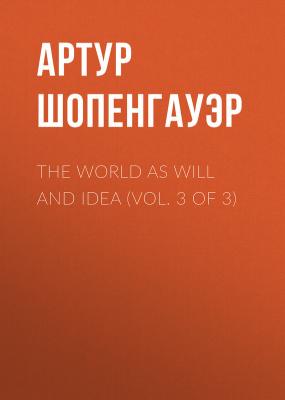for its ceaseless cares and troubles. The matter being taken thus, every one would rather have long ago said, “
Le jeu ne vaut pas la chandelle,” and have gone out. But, on the contrary, every one guards and defends his life, like a precious pledge intrusted to him under heavy responsibility, under infinite cares and abundant misery, even under which life is tolerable. The wherefore and the why, the reward for this, certainly he does not see; but he has accepted the worth of that pledge without seeing it, upon trust and faith, and does not know what it consists in. Hence I have said that these puppets are not pulled from without, but each bears in itself the clockwork from which its movements result. This is
the will to live, manifesting itself as an untiring machine, an irrational tendency, which has not its sufficient reason in the external world. It holds the individuals firmly upon the scene, and is the
primum mobile of their movements; while the external objects, the motives, only determine their direction in the particular case; otherwise the cause would not be at all suitable to the effect. For, as every manifestation of a force of nature has a cause, but the force of nature itself none, so every particular act of will has a motive, but the will in general has none: indeed at bottom these two are one and the same. The will, as that which is metaphysical, is everywhere the boundary-stone of every investigation, beyond which it cannot go. From the original and unconditioned nature of the will, which has been proved, it is explicable that man loves beyond everything else an existence full of misery, trouble, pain, and anxiety, and, again, full of ennui, which, if he considered and weighed it purely objectively, he would certainly abhor, and fears above all things the end of it, which is yet for him the one thing certain.
8 Accordingly we often see a miserable figure, deformed and shrunk with age, want, and disease, implore our help from the bottom of his heart for the prolongation of an existence, the end of which would necessarily appear altogether desirable if it were an objective judgment that determined here. Thus instead of this it is the blind will, appearing as the tendency to life, the love of life, and the sense of life; it is the same which makes the plants grow. This sense of life may be compared to a rope which is stretched above the puppet-show of the world of men, and on which the puppets hang by invisible threads, while apparently they are supported only by the ground beneath them (the objective value of life). But if the rope becomes weak the puppet sinks; if it breaks the puppet must fall, for the ground beneath it only seemed to support it:
i. e., the weakening of that love of life shows itself as hypochondria, spleen, melancholy: its entire exhaustion as the inclination to suicide, which now takes place on the slightest occasion, nay, for a merely imaginary reason, for now, as it were, the man seeks a quarrel with himself, in order to shoot himself dead, as many do with others for a like purpose; – indeed, upon necessity, suicide is resorted to without any special occasion. (Evidence of this will be found in Esquirol,
Des maladies mentales, 1838.) And as with the persistence in life, so is it also with its action and movement. This is not something freely chosen; but while every one would really gladly rest, want and ennui are the whips that keep the top spinning. Therefore the whole and every individual bears the stamp of a forced condition; and every one, in that, inwardly weary, he longs for rest, but yet must press forward, is like his planet, which does not fall into the sun only because a force driving it forward prevents it. Therefore everything is in continual strain and forced movement, and the course of the world goes on, to use an expression of Aristotle's (
De cœlo, ii. 13), “ου φυσει, αλλα βιᾳ” (
Motu, non naturali sed violento). Men are only apparently drawn from in front; really they are pushed from behind; it is not life that tempts them on, but necessity that drives them forward. The law of motivation is, like all causality, merely the form of the phenomenon. We may remark in passing that this is the source of the comical, the burlesque, the grotesque, the ridiculous side of life; for, urged forward against his will, every one bears himself as best he can, and the straits that thus arise often look comical enough, serious as is the misery which underlies them.
